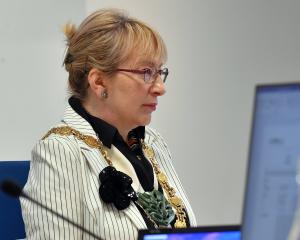
Wellington Hospital’s Dr Cindy Towns recently published a paper in the International Medicine Journal highlighting the risks that a lack of psychogeriatric beds, or mental health for older persons beds, poses in general hospitals.
"This practice is unsafe and has resulted, and will continue to result, in numerous assaults on staff and undue risk to medical patients," she said.
The paper outlines how five out of six patients with dementia will develop behavioural and psychological symptoms.
The condition can result in hallucinations, delusions, sleep disturbance, inappropriate sexual behaviour and aggression.
Dr Towns, who is also a lecturer for the University of Otago department of medicine in Wellington, said she wrote the paper after "seeing the harms on our ward [in Wellington] and the lack of attention being given to this serious and urgent need for more psychogeriatric beds".
Her research comes after Health New Zealand (HNZ), over a series of cuts, slashed the number of mental health for older people beds at the new Dunedin hospital from 24 to 8.
Dunedin Hospital has 12 such beds.
Dr Towns said the arrangement was "unethical" and "demonstrably unsafe" at present — reducing the number could make things even worse.
"More importantly, it puts patients at risk and it puts staff at risk.
"This is a huge burden that’s going to be placed on already overwhelmed general medical wards who don’t have the design or resources to safely manage these patients."
It was projected that the country’s population with dementia would increase from 70,000 to 170,000 by 2050, Dr Towns said.
"Everybody seems to have an innate understanding of the memory problems with dementia, but dementia also has psychiatric features and five out of six people with dementia will develop psychiatric features.
"When they’re not able to be managed by family or rest-homes, they present to the emergency department and they’re severe presentations."
There was also the concern about the potential legal issues should the capacity be set at that rate, Dr Towns said.
"If you slash psychogeriatric beds, you are putting patients at risk, you’re also putting staff at risk and you’re going to put a huge amount of pressure on general medical wards and geriatrics wards who also don’t have the resources or design to manage these patients."
Association of Salaried Medical Specialists director of policy and research Harriet Wild said decades of under-investment in health infrastructure, combined with prevalence of dementia in a growing population of older adults in New Zealand "creates a perfect storm".
"This increased risk of harm has serious and very real consequences for the health and safety of other patients, health workers, and people with dementia themselves.
"Growing the number of specialist psychogeriatric beds nationally — and staffing them safely, with psychiatrists and mental health nurses — must be a priority."
New Dunedin Hospital Clinical Transformation Group chairwoman Dr Sheila Barnett said HNZ updated its approach to bed modelling for all regional hospitals in a standardised approach.
"This was based on a predicted shift towards more outpatient and community-based care and a greater alignment with other Australasian bed modelling benchmarks.
"The updated national bed modelling for the new hospital has resulted in some adjustments in capacity for different areas to align with the expected demand, now and in the future.
"Overall, the New Dunedin Hospital will provide a similar total number of beds as was outlined in the detailed business case, but there is a change in the mix of bed types required and the timing of when they may be needed."
Clinicians continued to be involved in the operational commissioning of the inpatient building, she said.












